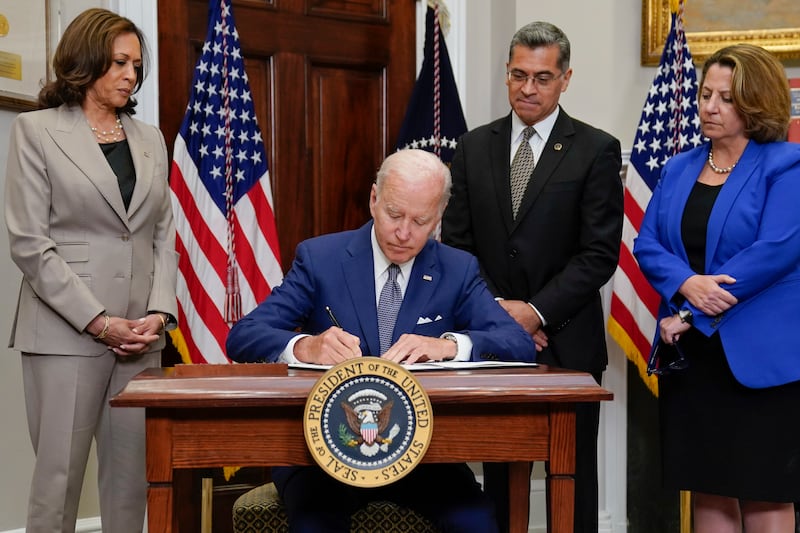President Joe Biden signed an executive order Friday aimed at strengthening access to abortion in response to the recent Supreme Court decision to overturn Roe v. Wade.
According to a White House fact sheet, the executive order attempts to protect access to reproductive care, including abortion and contraception.
“Fundamental rights — to privacy, autonomy, freedom and equality — have been denied to millions of women across the country, with grave implications for their health, lives and wellbeing,” the document said. “This ruling will disproportionately affect women of color, low-income women and rural women.”
Despite pressure from members of his party and other abortion-rights supporters, the president believes only Congress can restore a federal right to abortion.
“Biden has repeatedly said that he does not have the authority to restore the constitutional right to abortion that the court ended when it overturned Roe. In the hours after the ruling, the president said he was powerless to restore the status quo,” The New York Times reported,
“The only way we can secure a woman’s right to choose and the balance that existed is for Congress to restore the protections of Roe v. Wade as federal law,” the president said on June 24 after the Supreme Court released its opinion. “No executive action from the president can do that.”
But the White House release said Biden “has committed to doing everything in his power to defend reproductive rights and protect access to safe and legal abortions.”
The White House fact sheet outlines some of the features of the new executive order, noting that it will:
- Protect patient privacy and access to accurate information about reproductive health issues including abortion.
- Promote safety and security of patients, providers and clinics.
- Allow for better coordination of the implementation of federal efforts to protect reproductive rights and access to health care.
Biden has also directed Health and Human Services Secretary Xavier Becerra to take certain steps related to abortion and reproductive health. Becerra is required to submit a report on his department’s actions within 30 days, the White House said.
Among other steps, the administration says Becerra’s department will protect access to a medication the Food and Drug Administration approved 20 years ago that terminates pregnancy.
The accessibility of that medication is an issue Attorney Gen. Merrick Garland addressed in a written statement in late June. He said that states cannot ban that drug, Mifepristone, “based on disagreement with the FDA’s expert judgment about its safety and efficacy.”
Other steps promised in the executive order include ensuring access to emergency medical care and to contraception. The fact sheet says the attorney general and White House counsel will lead an effort to encourage private attorneys and others to offer “robust legal representation of patients, providers and third parties lawfully seeking or offering reproductive health care services throughout the country.” And it specifically says that could include protecting the right to travel out of state to seek medical care.
In his written statement, Garland said he would fight any attempts to interfere with women exercising their right to travel to obtain services. “The Constitution continues to restrict states’ authority to ban reproductive services provided outside their borders,” he said.
The administration notes that in all 50 states, the Affordable Care Act guarantees coverage of women’s preventive services and enables many women to access free birth control.
The executive order will also establish an interagency task force on reproductive health care access that includes the attorney general, Health and Human Services and the White House Gender Policy Council, among others. Garland will provide technical assistance “to states affording legal protection to out-of-state patients as well as providers who offer legal reproductive health care,” the White House said.
And the Biden administration said federal employees will be able to use paid sick leave to travel to obtain reproductive health care.
Critics want Biden to do more
Some of the steps outlined in the executive order are similar to options Politico outlined as the Supreme Court decision — which had been leaked — was pending.
“Earlier this week, 25 senators wrote to Biden pleading with him to drop the remaining FDA restrictions on abortion pills, which include a requirement that any pharmacy that distributes the drug obtain a special license. They also called for travel vouchers and other financial support to people crossing state lines for the procedure, cracking down on the states that are trying to drop Planned Parenthood from their Medicaid programs, ramping up protections around digital health data that could be used to prosecute people who have abortions and exploring whether abortions could be offered on federally owned properties even in states that implement bans. Democrats in Congress are also lobbying the Pentagon to allow service members who are stationed in states likely to ban abortion to take leave to travel for the procedure,” Politico reported in early June.
But some abortion-rights supporters have called on Biden to do much more. The New York Times reported that “some activists and lawmakers ... have urged the president to establish abortion services on federal land or on Native American territories, where state laws banning abortion services might not be enforceable. The White House has dismissed those ideas as legally unworkable and potentially even more dangerous for women seeking abortions.”
Biden has said he supports changing filibuster rules in the Senate so abortion and related privacy issues can become federal law.
According to USA Today, “Sixty votes are needed in the Senate to pass most legislation because of the filibuster. Changing the rules would allow senators to write Roe v. Wade into law with a simple majority. But getting rid of the filibuster is up to the Senate, and right now there aren’t enough votes to make that happen.”


